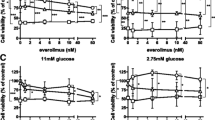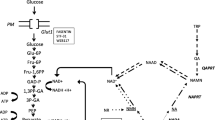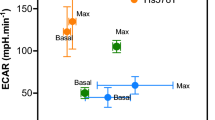Abstract
Purposes
Metformin, currently undergoing clinical trials as an adjuvant for the treatment of breast cancer, modulates the activity of key intracellular signalling molecules which affect 2-[18F]Fluoro-2-deoxy-d-glucose ([18F]FDG) incorporation. Here, we investigate the effect of drugs used in the treatment of breast cancer combined with metformin on [18F]FDG incorporation in HER2- or HER1-overexpressing breast cancer cells to determine whether or not metformin may obscure changes in [18F]FDG incorporation induced by clinically utilised anticancer drugs in the treatment of breast cancer.
Methods
Three breast cancer cell lines expressing HER2 and one HER2 negative but HER1 positive were exposed to metformin, doxorubicin and trastuzumab or cetuximab. Cytotoxicity was measured by the MTT assay. Expression of active (phospho-) AMPK, PKB (Akt) and ERK was determined by Western blotting. [18F]FDG incorporation by cells exposed to drug combinations with metformin was determined. Glucose transport was assessed by measuring the initial rate of uptake of [3H]O-methyl-d-glucose ([3H]OMG). Phosphorylation of [18F]FDG was determined in intact cells after exposure to [18F]FDG.
Results
Phospho-AMPK was increased by metformin in all cell lines whilst phospho-Akt and phospho-ERK expressions were decreased in two. Metformin treatment increased [18F]FDG incorporation in all cell lines, and treatment with anti-HER antibodies or doxorubicin only produced minor modulations in the increase induced by metformin alone. Glucose transport was increased in BT474 cells and decreased in SKBr3 and MDA-MB-468 cells after treatment with metformin. The fraction of phosphorylated [18F]FDG was increased in metformin-treated cells compared with controls, suggesting that hexokinase efficiency was increased by metformin.
Conclusion
This is the first study to show that increased [18F]FDG incorporation by breast cancer cells induced by metformin overwhelms the effect of doxorubicin and anti-HER treatments on [18F]FDG incorporation. Metformin-induced increased [18F]FDG incorporation was consistently associated with enhanced [18F]FDG phosphorylation.






Similar content being viewed by others
References
Aide N, Poulain L, Briand M et al (2009) Early evaluation of the effects of chemotherapy with longitudinal FDG small-animal PET in human testicular cancer xenografts: early flare response does not reflect refractory disease. Eur J Nucl Med Imaging 36:396–405
Batandier C, Guigas B, Detaille D, El-Mir MY, Fontaine E, Rigoulet M, Leverve XM (2006) The ROS production induced by a reverse-electron flux at respiratory-chain complex 1 is hampered by metformin. J Bioenerg Biomembr 206(38):33–42
Bodmer M, Meier C, Krahenbuhl S, Jick SS, Meier CR (2010) Long-term metformin use is associated with decreased risk of breast cancer. Diabetes Care 33:1304–1308
Buac D, Kona FR, Seth AK, Dou QP (2013) Regulation of metformin response by breast cancer associated gene 2. Neoplasia 15:1379
Cheyne RW, Trembleau L, McLaughlin AC, Smith TAD (2011) Changes in 2-Fluoro-2-deoxy-d-glucose incorporation, hexokinase activity and lactate production by breast cancer cells responding to treatment with the anti-HER-2 antibody trastuzumab. Nucl Med Biol 38:339–346
clinicaltrials.gov. Accessed 20 Aug 2014
Dowling RJ, Zakikhani M, Fantus IG, Pollak M, Sonenberg N (2007) Metformin inhibits mammalian target of rapamycin-dependent translation initiation in breast cancer cells. Cancer Res 67:10804–10812
El-Mir MY, Nogueira V, Fontaine E, Averet N, Rigoulet M, Leverve X (2000) Dimethylbiguanide inhibits cell respiration via an indirect effect targeted on the respiratory chain complex I. J Biol Chem 275:223–228
Evans JM, Donnelly LA, Emslie-Smith AM, Alessi DR, Morris AD (2005) Metformin and reduced risk cancer in diabetic patients. BMJ 330:1304–1305
Fleming IN, Andriu A, Smith TAD (2014) Early changes in [18F]FDG incorporation by breast cancer cells treated with trastuzumab in normoxic conditions: role of the Akt-pathway, glucose transport and HIF-1 alpha. Breast Cancer Res Treat 144:241–248
Guigas B, Detaille D, Chauvin C et al (2014) Metformin inhibits mitochondrial permeability transition and cell death: a pharmacological in vitro study. Biochem J 382:877–884
Habibollahi P, van den Berg NS, Kuruppu D, Loda M, Mahmood U (2013) Metformin-an adjunct antineoplastic therapy-divergently modulates tumor metabolism and proliferation, interfering with early response prediction by F-18-FDG PET imaging. J Nucl Med 54:252–258
Jalving M, Gietema JA, Lefrandt JD, de Jong S, Reyners AK, Gans RO, de Vries EG (2010) Metformin: taking away the candy for cancer? Eur J Cancer 46:2369–2380
Jiralerspong S, Palla SL, Giordano SH, Meric-Bernstam F, Liedtke C, Barnett CM et al (2009) Metformin and pathologic complete responses to neoadjuvant chemotherapy in diabetic patients with breast cancer. J Clin Oncol 27:3297–3302
Kletzien RF, Perdue JF (1974) Sugar transport in chick embryo fibroblasts. J Biol Chem 249:3366–3374
Kontny NE, Wurthwein G, Joachim B et al (2013) Population pharmacokinetics of doxorubicin: establishment of a NONMEM model for adults and children older than 3 years. Cancer Chemother Pharmacol 71:749–763
Li WN, Ma WY, Zhong H, Liu WB, Sun Q (2014) Metformin inhibits proliferation of human keratinocytes through a mechanism associated with activation of the MAPK signaling pathway. Exp Ther Med 7:389–392
Liu BL, Fan ZY, Edgerton SM, Yang XH, Lind SE, Thor AD (2011) Potent anti-proliferative effects of metformin on trastuzumab-resistant breast cancer cells via inhibition of ErbB2/IGF-1 receptor interactions. Cell Cycle 10:2959–2966
Marini C, Salani B, Massollo M et al (2013) Direct inhibition of hexokinase activity by metformin at least partially impairs glucose metabolism and tumor growth in experimental breast cancer. Cell Cycle 12:3490–3499
Mghanga FP, Lan XL, Bakari KH, Li CJ, Zhang YX (2013) Fluorine-18 fluorodeoxyglucose positron emission tomography-computed tomography in monitoring the response of breast cancer to neoadjuvant chemotherapy: a meta-analysis. Clin Cancer Res 13:271–279
Ning J, Clemmons DR (2010) AMP-activated protein kinase inhibits IGF-I signaling and protein synthesis in vascular smooth muscle cells via stimulation of insulin receptor substrate 1 S794 and tuberous sclerosis 2 S1345 phosphorylation. Mol Endocrinol 24:1218–1229
Normanno N, Campiglio M, De Luca A et al (2002) Cooperative inhibitory effect of ZD1839 (Iressa) in combination with trastuzumab (Herceptin) on human breast cancer cell growth. Ann Oncol 13:65–72
Otto M, Breinholt J, Westergaard N (2003) Metformin inhibits glycogen synthesis and gluconeogenesis in cultured rat hepatocytes. Diabetes Obes Metab 5:189–194
Owen MR, Doran E, Halestrap AP (2000) Evidence that metformin exerts its anti-diabetic effects through inhibition of complex 1 of the mitochondrial respiratory chain. Biochem J 348:607–614
Pollak M (2013) Potential applications for biguanides in oncology. J Clin Investig 123:3693–3700
Queiroz EAIF, Puukila S, Eichler R, Sampaio SC, Forsyth HL, Lees SJ, Barbosa AM, Dekker RFH, Fortes ZB, Khaper N (2014) Metformin induces apoptosis and cell cycle arrest mediated by oxidative stress, AMPK and FOXO3a in MCF-7 breast cancer cells. PLoS One 9:e98207
Schafer G (1976) Mechanism of action of hypoglycemia-producing biguanides—re-evaluation and a molecular theory. Biochem Pharmacol 25:2005–2014
Slamon DJ, Leyland-Jones B, Shak S, Fuchs H, Paton V, Bajamonde A et al (2001) Use of chemotherapy plus a monoclonal antibody against HER2 for metastatic breast cancer that overexpresses HER2. N Engl J Med 344:783–792
Sliwinska MA, Mosieniak G, Wolanin K, Babik A, Piwocka K, Magalska A, Szczepanowska J, Fronk J, Sikora E (2009) Induction of senescence with doxorubicin leads to increased genomic instability of HCT1 16 cells. Mech Ageing Dev 13:24–32
Smith TAD, Zanda M, Fleming IN (2013) Hypoxia stimulates 18F-Fluorodeoxyglucose uptake in breast cancer cells via hypoxia inducible factor-1 and AMP-activated protein kinase. Nucl Med Biol 40:858–864
Soares HP, Ni Y, Kisfalvi K, Sinnett-Smith J, Rozengurt E (2013) Different patterns of Akt and ERK feedback activation in response to rapamycin, active-Site mTOR inhibitors and metformin in pancreatic cancer cells. PLoS One 8:e57289
Swaminathan R, Bicknese S, Periasamy N, Verkman AS (1996) Cytoplasmic viscosity near the cell plasma membrane: translational diffusion of a small fluorescent solute measured by total internal reflection-fluorescence photobleaching recovery. Biophys J 71:1140–1151
Thompson AM (2014) Molecular pathways: preclinical models and clinical trials with metformin in breast cancer. Clin Cancer Res 20:2508–2515
Vazquez-Martin A, Oliveras-Ferraros C, Del Barco S, Martin-Castillo B, Menendez JA (2011) The anti-diabetic drug metformin suppresses selfrenewal and proliferation of trastuzumab-resistant tumor-initiating breast cancer stem cells. Breast Cancer Res Treat 126:355–364
Viollet B, Guigas B, Garcia NS, Leclerc J, Foretz M, Andreelli F (2012) Cellular and molecular mechanisms of metformin: an overview. Clin Sci 122:253–270
Wiernsperger NF (1999) Membrane physiology as a basis for the cellular effects of metformin in insulin resistance and diabetes. Diabetes Metab 25:110–163
Wurth R, Pattarozzi A, Gatti M, Bajetto A, Corsaro A, Parodi A, Sirito R, Massollo M, Marini C, Zona G, Fenoglio D, Sambuceti G, Filaci G, Daga A, Barbieri F, Florio T (2013) Metformin selectively affects human glioblastoma tumor-initiating cell viability: a role for metformin-induced inhibition of Akt. Cell Cycle 12:145–156
Zhu P, Davis M, Blackwelder AJ et al (2014) metformin selectively targets tumor-initiating cells in ErbB2-overexpressing breast cancer models. Cancer Prev Res 7:199–210
Zordoky BNM, Bark D, Soltys CL, Sung MM, Dyck JRB (2014) The anti-proliferative effect of metformin in triple-negative MDA-MB-231 breast cancer cells is highly dependent on glucose concentration: implications for cancer therapy and prevention. Biochim Biophys Acta 1840:1943–1957
Conflict of interest
The authors have no conflicts of interest.
Author information
Authors and Affiliations
Corresponding author
Rights and permissions
About this article
Cite this article
Cooper, A.C., Fleming, I.N., Phyu, S.M. et al. Changes in [18F]Fluoro-2-deoxy-d-glucose incorporation induced by doxorubicin and anti-HER antibodies by breast cancer cells modulated by co-treatment with metformin and its effects on intracellular signalling. J Cancer Res Clin Oncol 141, 1523–1532 (2015). https://doi.org/10.1007/s00432-015-1909-2
Received:
Accepted:
Published:
Issue Date:
DOI: https://doi.org/10.1007/s00432-015-1909-2




